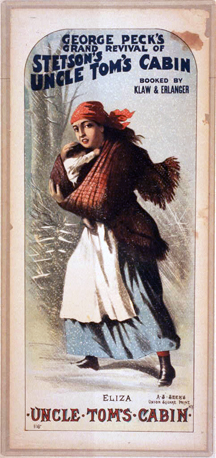Share |
Theatre: Can theater be democratic?
By Robert W. Bethune
ART TIMES November/ December 2012
 |
I mean small-d democratic, by the way; I’m referring to the political concept, not to the political party.
As Dudley Cocke points out in his recent piece, “Rural Theater in a Democracy,” theater in this country has had pretty strong democratic impulses from time to time. He points to the broad appeal of theater in the 19th century, a time when touring countries and local stock companies made theater a functioning part of everyday life in lots of places around the country that now have little or no theatrical activity of any kind, let alone theaters and companies that actually paid people to do the work. He also points to phenomena such as the Federal Theatre Project and the ethnic theater movements of the mid-20th century.
However, as he also points out, the push-back against theater that aspires to be democratic is very strong. Most people who attend professional theater have top-level incomes; 85th percentile and up. Most charitable giving to professional theaters is by wealthy people or the foundations they fund.
This basic situation – theater of and for the elite – is scarcely unique in the history of the art form. The ancient Greeks on one hand treated theater as a public good, a high-level art to be supported by the government and the wealthy, while on the other hand Greek society included traveling theatrical performers playing to any audience they could get and existing fairly close to the bottom of the social structure. We find that pattern all over the world: a theater of the elites regarded as a valuable art form and a theater of the people regarded, at least by the elites, as trash. That formula applied to the American theater that Cocke celebrates. A rural father might take his family to the performance by local stock-company or touring actors, but God forbid that his daughter marry one of them. A wealthy urban socialite would be happy to attend a performance by Garrick or Irving, but wouldn’t be caught dead at a touring production in Peoria.
I think this history shows that you can have a democratic theater, but there has to be a foundation for it in the fundamental attitude of the society toward how the theater folk relate to their audiences. In the non-elite, lower-class theatrical situations, there is a fundamental expectation that the theater people will respond to the audience, providing them with the entertainment they want. In the theater by and for the elite, the expectation is that the audience will respond to the theater; that the theater will uplift and instruct as well as entertain—which presupposes that the people providing the performances have something to say that’s worth listening to, which the audience shall dutifully heed.
The idea that theater artists have superior notions to present is fundamentally aristocratic. It presupposes a down-the-nose attitude, an attitude of “I know and you don’t so listen up.” The fundamentally democratic attitude is, “Here’s what I think, what do you think?” That attitude is not often found among theater companies. Very, very few companies have anything like that kind of functional give-and-take with their audiences.
Ever since 1600, we have fundamentally regarded our audiences as mere “groundlings, who for the most part are capable of nothing but inexplicable dumb-shows and noise.” Our talk-back’s usually become talk-to’s pretty quickly, and are, in any case, dreaded and avoided at all costs. Our audience surveys are collected, filed and forgotten even if they are designed well enough to actually provide useful information. The first and foremost goal is to create plays and productions that satisfy the souls of the artists; the feedback comes from friends, family and colleagues who share the same esthetic and pursue the same goals. The rare stranger who manages to make contact long enough to offer a genuine response is brushed off as quickly as possible.
That’s about as aristocratic as it gets. The aristocratic attitude is deeply engrained in the fundamentals of how theater works as an institution and a business, how it is funded and structured. A democratic theater is possible; there have been democratic theaters in the past, but the modern American theater is definitely not one of them. That is one reason why it is in such poor condition and occupies such an unimportant position.
Bethune website: www.freshwaterseas.com
